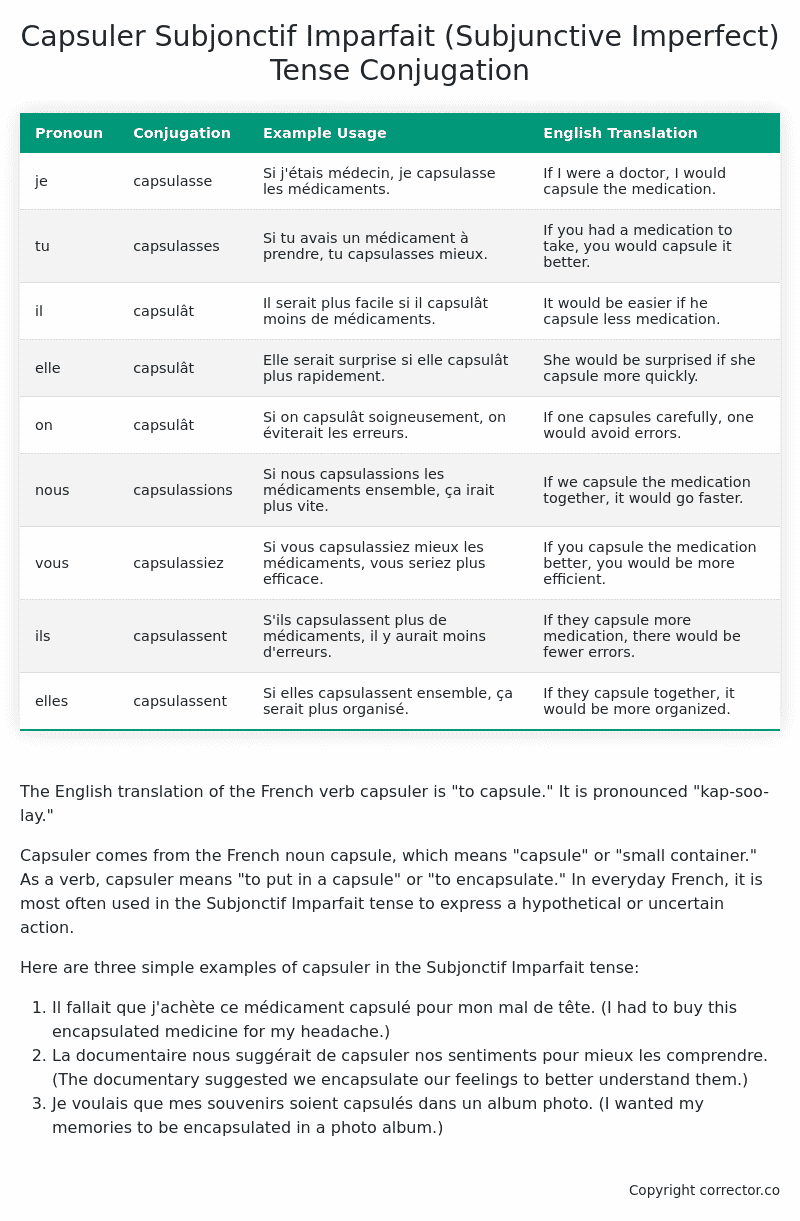Subjonctif Imparfait (Subjunctive Imperfect) Tense Conjugation of the French Verb capsuler
Introduction to the verb capsuler
The English translation of the French verb capsuler is “to capsule.” It is pronounced “kap-soo-lay.”
Capsuler comes from the French noun capsule, which means “capsule” or “small container.” As a verb, capsuler means “to put in a capsule” or “to encapsulate.” In everyday French, it is most often used in the Subjonctif Imparfait tense to express a hypothetical or uncertain action.
Here are three simple examples of capsuler in the Subjonctif Imparfait tense:
- Il fallait que j’achète ce médicament capsulé pour mon mal de tête. (I had to buy this encapsulated medicine for my headache.)
- La documentaire nous suggérait de capsuler nos sentiments pour mieux les comprendre. (The documentary suggested we encapsulate our feelings to better understand them.)
- Je voulais que mes souvenirs soient capsulés dans un album photo. (I wanted my memories to be encapsulated in a photo album.)
Table of the Subjonctif Imparfait (Subjunctive Imperfect) Tense Conjugation of capsuler
| Pronoun | Conjugation | Example Usage | English Translation |
|---|---|---|---|
| je | capsulasse | Si j’étais médecin, je capsulasse les médicaments. | If I were a doctor, I would capsule the medication. |
| tu | capsulasses | Si tu avais un médicament à prendre, tu capsulasses mieux. | If you had a medication to take, you would capsule it better. |
| il | capsulât | Il serait plus facile si il capsulât moins de médicaments. | It would be easier if he capsule less medication. |
| elle | capsulât | Elle serait surprise si elle capsulât plus rapidement. | She would be surprised if she capsule more quickly. |
| on | capsulât | Si on capsulât soigneusement, on éviterait les erreurs. | If one capsules carefully, one would avoid errors. |
| nous | capsulassions | Si nous capsulassions les médicaments ensemble, ça irait plus vite. | If we capsule the medication together, it would go faster. |
| vous | capsulassiez | Si vous capsulassiez mieux les médicaments, vous seriez plus efficace. | If you capsule the medication better, you would be more efficient. |
| ils | capsulassent | S’ils capsulassent plus de médicaments, il y aurait moins d’erreurs. | If they capsule more medication, there would be fewer errors. |
| elles | capsulassent | Si elles capsulassent ensemble, ça serait plus organisé. | If they capsule together, it would be more organized. |
Other Conjugations for Capsuler.
Le Present (Present Tense) Conjugation of the French Verb capsuler
Imparfait (Imperfect) Tense Conjugation of the French Verb capsuler
Passé Simple (Simple Past) Tense Conjugation of the French Verb capsuler
Passé Composé (Present Perfect) Tense Conjugation of the French Verb capsuler
Futur Simple (Simple Future) Tense Conjugation of the French Verb capsuler
Futur Proche (Near Future) Tense Conjugation of the French Verb capsuler
Plus-que-parfait (Pluperfect) Tense Conjugation of the French Verb capsuler
Passé Antérieur (Past Anterior) Tense Conjugation of the French Verb capsuler
Futur Antérieur (Future Anterior) Tense Conjugation of the French Verb capsuler
Subjonctif Présent (Subjunctive Present) Tense Conjugation of the French Verb capsuler
Subjonctif Passé (Subjunctive Past) Tense Conjugation of the French Verb capsuler
Subjonctif Imparfait (Subjunctive Imperfect) Tense Conjugation of the French Verb capsuler (this article)
Subjonctif Plus-que-parfait (Subjunctive Pluperfect) Tense Conjugation of the French Verb capsuler
Conditionnel Présent (Conditional Present) Tense Conjugation of the French Verb capsuler
Conditionnel Passé (Conditional Past) Tense Conjugation of the French Verb capsuler
L’impératif Présent (Imperative Present) Tense Conjugation of the French Verb capsuler
L’infinitif Présent (Infinitive Present) Tense Conjugation of the French Verb capsuler
Struggling with French verbs or the language in general? Why not use our free French Grammar Checker – no registration required!
Get a FREE Download Study Sheet of this Conjugation 🔥
Simply right click the image below, click “save image” and get your free reference for the capsuler Subjonctif Imparfait tense conjugation!

Capsuler – About the French Subjonctif Imparfait (Subjunctive Imperfect) Tense
Formation
Common Everyday Usage Patterns
Interactions with Other Tenses
Subjonctif Présent
Indicatif Passé Composé
Conditional
Conditional Perfect
Summary
I hope you enjoyed this article on the verb capsuler. Still in a learning mood? Check out another TOTALLY random French verb conjugation!


